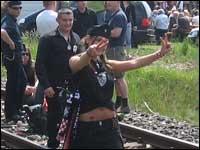Transcript
BROOKE GLADSTONE:
This is On The Media. I’m Brooke Gladstone.
BOB GARFIELD:
And I’m Bob Garfield. In Croatia, patriotism and national pride are tangled in a history as checkered as the shield on the nation’s flag. For years, the country has tried to come to terms with its World War II era Fascist government, the Ustasas, a puppet state of the Nazis. In the more recent past, Croatia’s crimes against humanity during the Balkan Wars served as painful reminders of the ease with which deep-rooted intolerance can resurface.
As the country wrestles with this past, the popularity of a rock star named Marko Perkovic has some people concerned. His fans adorn themselves with Ustasa symbols, and nearly swoon when he starts his show with Ustasa salutes.
But is this a Fascist resurgence or just teenage rebellion from kids who don’t understand their own history? Sdrjan Dvornik is executive director of the Croatian Branch of the Helsinki Committee for Human Rights. He describes the scene at Perkovic’s concert last month in Zagreb before 40,000 cheering adolescents.
SDRJAN DVORNIK:
There were many young people wearing Ustasa symbols. The singer himself started the concert with a salute, an Ustasa salute, so he’s obviously playing on such symbols. And that’s really what worries everybody.
BOB GARFIELD:
I want to know what Croats learn in school about the Ustasa history of World War II and Croatia’s culpability in the Holocaust, which was not insubstantial – hundreds of thousands killed. Is this covered?
SDRJAN DVORNIK:
Hardly. In the textbooks you only find a few sentences. The prevailing attitude is that the most important thing is to defend your country, and all other things are of secondary importance.
So they don’t really care whether it was Fascist- committed war crimes or whether Croatian defendants in early ‘90s committed war crimes. What matters is that that was for Croatia.
BOB GARFIELD:
Tell me please about the public reaction to the Perkovic concert. There were some very public complaints expressed, notably by Jews who were disgusted at the Fascist symbolism.
SDRJAN DVORNIK:
In mainstream media, in government statements and so on, I think everybody now would like to forget the whole thing as soon as possible.
But, on the other hand, the Minister of Education was ready to attend the concert on Saturday, and only thanks to the fact that it was postponed for one day because of bad weather, he did not. But before the concert on Saturday, he made a statement that it’s so nice to see so many young people attending such events.
BOB GARFIELD:
Unlike Serbia, which seems not to quite have come to grips with its culpability in the Balkan Wars, Croatia has done a fairly straightforward job of, you know, de-Nazification, and yet the Minister of Education doesn’t seem to be disturbed [LAUGHS] by hundreds or thousands of young people wearing the black Ustasa caps with some pride. There’s a strange disconnect there. Can you explain it?
SDRJAN DVORNIK:
Well, first of all I can say clearly and publicly - I can be quoted in Croatia - I think that our minister of education is a political idiot. The government, the political elite, they know that now it’s politically correct to be against that kind of extremism. That’s a matter of adjusting to expectations from abroad. They’re all nationalistic. But they know that it is no longer something you show in public.
BOB GARFIELD:
Well, in the ‘90s, you know, we learned that longstanding suppressed hostility can rise to the surface in the most horrifying ways. Do we have any reason to fear for this generation that’s, you know, in a stadium exchanging the Nazi salute with a pop band?
SDRJAN DVORNIK:
I was born in 1953. As a friend of mine says, we did not have a hate speech. We had hate silence. We had memories that were suppressed, that were not discussed in the public, that were suppressed under the heavy layer of Communist ideology, so it all burst out with the coming of democracy. It’s a paradox, but that’s true. The open nationalism and chauvinism came to the fore with democracy.
But now we have had possibility to confront such intolerance, so it is possible that gradually we will be able to show the young people why this is wrong, not because it is forbidden, not because they will be arrested and so on, but because it is wrong.
BOB GARFIELD:
Well, Sdrjan, thank you so much for joining us.
SDRJAN DVORNIK:
You’re welcome.
BOB GARFIELD:
Sdrjan Dvornik is executive director of the Croatian branch of the Helsinki Committee for Human Rights.


